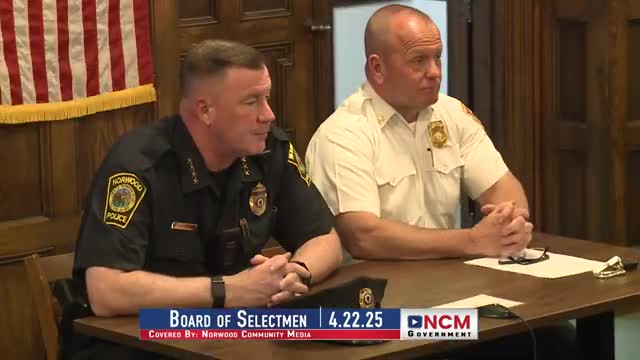Norwood police report rising citations, arrests and digital-fraud responses
Get AI-powered insights, summaries, and transcripts
Subscribe
Summary
Police Chief Christopher Padden briefed the Selectmen on increased traffic enforcement, projected rises in arrests for the year, heavy training commitments and local efforts to respond to wire-transfer and cryptocurrency scams that often target seniors.
Chief Christopher Padden told the Board of Selectmen the department is seeing higher traffic-enforcement activity, more arrests projected for the year compared with last year and a heavier training cycle to meet state mandates and voluntary programs.
Padden reported the department’s citation total around the quarter mark as 2,156 and said that figure projects to roughly 8,600 citations by year-end if current trends continue. He said arrests to date are 157 and projected to rise; last year the department recorded 402 arrests.
“We have extra traffic enforcement and extra walking beats in the Uptown and South Moet area,” Padden said, adding that an officer has been assigned full-time to traffic on high-incident days to reduce crashes and red-light violations.
Padden described recent weekend operations supporting regional events — plainclothes officers on a marathon route, officers posted for the 250th anniversary observances — and local arrests, juvenile crimes and two recent DUI crashes.
On training, he said the department completed the state-required 40-hour in-service cycle (an estimated 2,600 training hours department-wide) and is sending personnel to voluntary classes, including instruction on identifying imposters and deceptive identification. Padden said the department’s cyber- and financial-fraud expertise helped recover funds and that officers worked with the U.S. Attorney’s Office to train other Norfolk County agencies on cryptocurrency and wire-fraud schemes.
Padden told the board that “our officers we actually sponsored with the US Attorney's Office ... to train everybody on how to do that,” and stressed seniors are frequently targeted by phone and text scams that prompt large monetary losses.
On staffing, he said the department has recruited lateral transfers and academy graduates; several new officers are finishing field training and some hires were experienced officers (he named Travis Dixon, a 15-year officer from Wellesley). He noted the time it takes for an officer to reach full proficiency — roughly five years — and said a mix of new recruits and lateral hires helps maintain experience.
The board asked about Real ID; Padden said Real ID primarily affects travel and not local policing, and noted residents with passports are already accepted for identification purposes.
Ending: The Selectmen thanked the chief and expressed support for continued traffic enforcement and senior-protection outreach.
